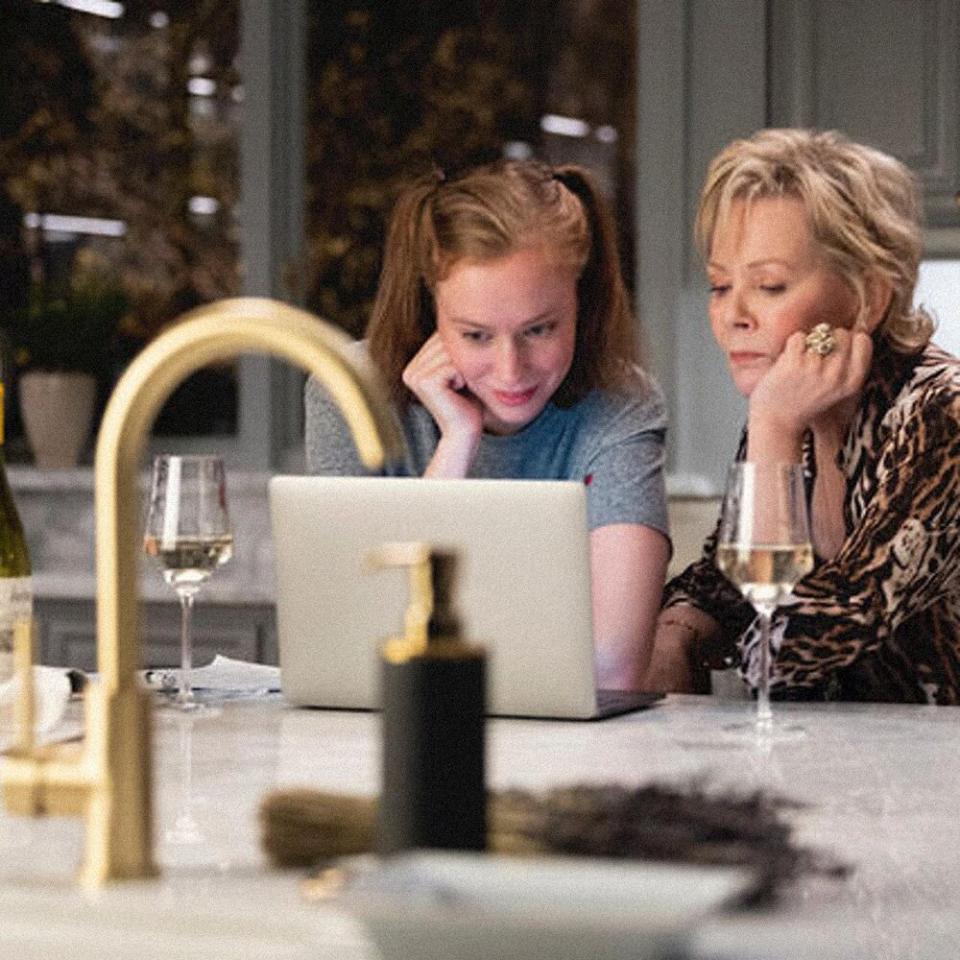The Girlboss Complex Has a Miranda Priestly Problem

Shutterstock/HBO
There's a moment in the debut season of Hacks where Deborah Vance, the jaded, seen-it-all, stand up comedian with more money than God (or at least, Celine Dion), tells Ava, the young ingenue in her employ, "Good is the minimum. It's the baseline. And even if you're great, you still have to work really fucking hard. You have to scratch and claw and it never fucking ends. And it doesn't get better — it just gets harder."
This, in a sense, is Deborah's mission statement — it's Deborah explaining why she is the way she is, hardened to the world and (initially) reluctant to change — and it calls to mind a similar scene in Hacks' forebear, The Devil Wears Prada, the much-loved film about another prickly 50-something woman in power. In Devil Wears Prada, Andie (Anne Hathaway) catches her boss, Miranda Priestly (Meryl Streep), in a rare moment of vulnerability, at which point she reveals that maybe, just maybe, far beneath that icy exterior is an actual beating heart. "The Dragon Lady. Career-obsessed. Snow Queen drives away another Mr. Priestly," Miranda says, punching a hole through the myth that enshrouds her.
If it feels like Hacks has a dynamic we've seen before — it's because we have, of course not only in Devil Wears Prada, but in other films like The High Note, Late Night, Cruella, and dating all the way back to All About Eve.
In Hacks and Devil Wears Prada, both Miranda and Deborah — the latter played with rich emotional texture by Jean Smart — face threats to their empire. There are plans for Miranda to be ousted for a younger, Frencher version of herself, and Deborah is set to lose her coveted spot headlining at the Palmetto Casino in Vegas. Because of their age, both women are staring down irrelevancy; however, Hacks takes pains to make clear that at least some of Deborah's undoing is of her own volition. Miranda, on the other hand, is still the best at what she does, and has next to nothing to gain from Andie — other than her loyalty and creative problem-solving.

HBO
Here is where Hacks diverges from its predecessor: Deborah agrees to try on Ava's story-telling approach to comedy in order to freshen up her act, and thus, Ava (Hannah Einbinder) has something to teach Deborah. Because their relationship is two-sided (albeit lopsided, but still), we get to see a side of Deborah that we don't of Miranda. Both elders initially dispense the younger women with harsh treatment and impossible tasks; to them, this is preparation for a career in a world where, because they are women, they are ultimately dispensable, replaceable. As the credits roll on Devil Wears Prada, with Miranda's smile and laugh after spotting Andie on the street, the audience gets the sense that Miranda is happy Andie learned to stand up for herself, but not necessarily that Miranda herself has learned anything from the experience. Another girl takes Andie's desk, and life in Miranda's world continues uninterrupted.
And maybe it's because we understand the sacrifices made by Miranda and Deborah to get where they are, how rare it is still to see women achieve that level of success, that we can't help but be charmed by these characters, even if their behavior is inappropriate. Perhaps the greatest evidence of this is that "the movie villain versus the actual villain" meme that cyclically floats around the internet, positing that Miranda is not actually the villain of The Devil Wears Prada, but rather Andie's boyfriend Nate (Adrian Grenier) is for holding her back from a fabulous career. Deborah, too, has sparked similar admiration.
RELATED: What the Stars Wore to the Premiere of The Devil Wears Prada
Because Hacks plays out over the course of 10 episodes — with more on the way — there is, of course, more opportunities to delve deeper into what made Deborah, as the creators put it, "Martha Stewart meets Tony Soprano." It's not just the big things that hardened Deborah over time — her ex-husband's betrayal, getting passed up for a late night hosting gig — but it's the misogynistic micro-aggressions that do it too, that are all too common when a woman exerts or tries to achieve power, as deftly portrayed in the Hacks episode "1.69 Million." Ava takes Deborah to task for not doing more for the women who followed in her footsteps; Deborah counters that just her success in and of itself should be enough for those who come after, a common argument between feminists of today and feminists of yore. Deborah proceeds to then pay a creep off to stay out of comedy forever, helping to ensure at least one club will be a safer space. In retrospect, it seems likely that Miranda experienced similar injustices — but as Devil Wears Prada preceded the #MeToo movement by a decade, this is only more obvious now, knowing what we know about any and all male dominated industries.
Like Miranda, Deborah forces her young employee to jump through hoops, and her abuse of Ava is at times horrifying (particularly when you consider the toxicity in comedy that continues to run rampant today), yet it's Deborah's eventual softening, by trying out that different routine and finally promoting her most devoted employee, that differentiates Hacks from Devil Wears Prada.The mentor-ingenue is a rich subject to explore, and one that doesn't appear to be fading from our pop culture lexicon. As we tell new stories about women in positions of power, they should reflect varying experiences of female leadership; studies that show women make for better bosses, yet there are still too few of them. And let's go ahead and cast Jean Smart in all those movies and shows, too.

 Yahoo Movies
Yahoo Movies 